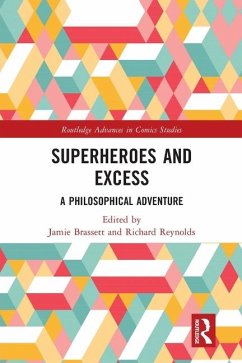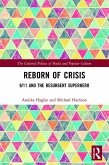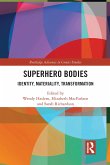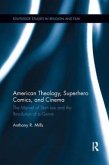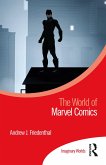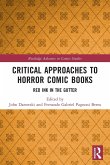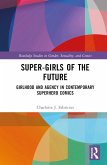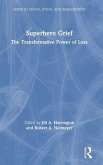Finding the superhero genre in need of further investigation from philosophical standpoints that value excess as a creative drive, rather than denigrate it as a problem to be resolved, this book opens up discussions that highlight different approaches to 'the creative excess of being' as expressed through the genre.
While superheroes are an everyday, culturally dominant phenomena, philosophical methods and investigations have a reputation for lofty superiority. Across 13 chapters, this book facilitates a collision between the superhero genre and the discipline of philosophy, resulting in a voyage of exploration where each illuminates the other. The contributions in this book range from new voices to recognized scholars, offering superhero studies a set of critical interventions that are unusual, conceptually diverse, theoretically grounded and varied in practice. These chapters consider 'excessive' traits of superheroes against schools of thought that have attempted toconceptualize and understand excess by analysing texts and figures across a variety of mediums, such as The Fantastic Four, Captain America, The Vision, Logan, Black Panther and Super Hero Girls.
With its unique approach to the superhero genre, this book will be an invaluable read for students and scholars working on comic studies, transmedia studies, cultural studies, popular culture and superhero studies.
While superheroes are an everyday, culturally dominant phenomena, philosophical methods and investigations have a reputation for lofty superiority. Across 13 chapters, this book facilitates a collision between the superhero genre and the discipline of philosophy, resulting in a voyage of exploration where each illuminates the other. The contributions in this book range from new voices to recognized scholars, offering superhero studies a set of critical interventions that are unusual, conceptually diverse, theoretically grounded and varied in practice. These chapters consider 'excessive' traits of superheroes against schools of thought that have attempted toconceptualize and understand excess by analysing texts and figures across a variety of mediums, such as The Fantastic Four, Captain America, The Vision, Logan, Black Panther and Super Hero Girls.
With its unique approach to the superhero genre, this book will be an invaluable read for students and scholars working on comic studies, transmedia studies, cultural studies, popular culture and superhero studies.
Superheroes and Excess uses the narrative and genre excesses of the superhero to explore the field where critical theory meets cultural studies. The fertility of this approach is revealed in the variety of essays that range from reflections on neoliberal economics and the repetitive traditions of comic book superheroes, Captain America's critical encounter with the Cold War excesses of the Reagan administration, and the quest for an authentic identity -individual and societal-from Witchblade to Marvel's Agents of S.H.I.E.L.D to superhero merchandising. Superheroes and Excess brings philosophy and cultural studies together to explore the superhero narrative, creating a unique and provocative window onto the contemporary political economy and should be read by not only by people interested in superheroes, but anyone interested in critical theory, cultural studies, and the impact of neoliberalism on contemporary society.
Matthew Costello, Saint Xavier University, author of Secret Identity Crisis: Comic Books and the Unmasking of Cold War America (2009)
Superheroes and Excess is a collection of bold, multi-disciplinary essays, each grappling with a variety of topics (gender, race, genre, media and more). Academically rigorous, and at times playful, Brassett and Reynolds set out to explore all facets of the superhero through philosophies of excess. Framed as an important creative drive, this use of excess allows the collection to stand as an expedition; a journey (or even an adventure) into the superhero genre and its extravagances. Themselves reluctant to claim the collection produces any definite and final answers; the contributors nonetheless provide compelling interpretations that any superhero scholar will need to wade into to further their own understanding of both the superhero figure and genre.
Esther De Dauw, Newman University, Birmingham, author of Hot Pants and Spandex Suits: Gender Representation in American Superhero Comic Books (2020)
Superheroes and Excess: A Philosophical Adventure is a wonderful new dive into the world of superhero comics. The field of comics studies has no doubt had a few good battles with philosophy but this volume gives us an expansive and comprehensible insight into the very functioning of superhero narratives. They argue, "Everything within the superhero genre tends towards the condition of excess" and this includes "the wider participatory super-culture." The notion of excess is a great fit. It touches the core of what makes the genre function and thrive, then occasionally collapse, but also rejuvenate. The articles, which deal with a wide range of comics, though mainly American, are well synchronized and together offer a great deal more than the sum of their individual parts. Much of this is thanks to the editors framing narrative, or framing analyses, which allow some refreshing creativity and experimentation as well as scholarly rigour.
Adnan Mahmutovic, Stockholm University, author of Visions of the Future in Comics (2017)
Superheroes and Excess offers an illuminating and generative contribution to the growing scholarly literature on superheroes in comics and film. Brassett, Reynolds, and their coauthors are to be congratulated for having many fresh things to say about Captain America, the Fantastic Four, Image Comics, Jack Kirby, the X-Men, Wonder Woman, and other key players in the superhero omniverse. Anyone with an interest in the nexus of philosophy and popular culture will want to know about this book.
Kent Worcester, Marymount Manhattan College, co-editor of A Comics Studies Reader (2008) and The Superhero Reader (2013)
In recognizing the creative power of excess, this collection boldly performs its own excessive difference from existing superhero scholarship. Provocative and thoroughly engaging, these essays compel a serious reconsideration of the power of excess as a philosophical way of being by way of a genre that we cannot think of in the same way ever again.
Matt Yockey, University of Toledo, editor of Make Ours Marvel: Media Convergence and A Comics Universe (2017)
Matthew Costello, Saint Xavier University, author of Secret Identity Crisis: Comic Books and the Unmasking of Cold War America (2009)
Superheroes and Excess is a collection of bold, multi-disciplinary essays, each grappling with a variety of topics (gender, race, genre, media and more). Academically rigorous, and at times playful, Brassett and Reynolds set out to explore all facets of the superhero through philosophies of excess. Framed as an important creative drive, this use of excess allows the collection to stand as an expedition; a journey (or even an adventure) into the superhero genre and its extravagances. Themselves reluctant to claim the collection produces any definite and final answers; the contributors nonetheless provide compelling interpretations that any superhero scholar will need to wade into to further their own understanding of both the superhero figure and genre.
Esther De Dauw, Newman University, Birmingham, author of Hot Pants and Spandex Suits: Gender Representation in American Superhero Comic Books (2020)
Superheroes and Excess: A Philosophical Adventure is a wonderful new dive into the world of superhero comics. The field of comics studies has no doubt had a few good battles with philosophy but this volume gives us an expansive and comprehensible insight into the very functioning of superhero narratives. They argue, "Everything within the superhero genre tends towards the condition of excess" and this includes "the wider participatory super-culture." The notion of excess is a great fit. It touches the core of what makes the genre function and thrive, then occasionally collapse, but also rejuvenate. The articles, which deal with a wide range of comics, though mainly American, are well synchronized and together offer a great deal more than the sum of their individual parts. Much of this is thanks to the editors framing narrative, or framing analyses, which allow some refreshing creativity and experimentation as well as scholarly rigour.
Adnan Mahmutovic, Stockholm University, author of Visions of the Future in Comics (2017)
Superheroes and Excess offers an illuminating and generative contribution to the growing scholarly literature on superheroes in comics and film. Brassett, Reynolds, and their coauthors are to be congratulated for having many fresh things to say about Captain America, the Fantastic Four, Image Comics, Jack Kirby, the X-Men, Wonder Woman, and other key players in the superhero omniverse. Anyone with an interest in the nexus of philosophy and popular culture will want to know about this book.
Kent Worcester, Marymount Manhattan College, co-editor of A Comics Studies Reader (2008) and The Superhero Reader (2013)
In recognizing the creative power of excess, this collection boldly performs its own excessive difference from existing superhero scholarship. Provocative and thoroughly engaging, these essays compel a serious reconsideration of the power of excess as a philosophical way of being by way of a genre that we cannot think of in the same way ever again.
Matt Yockey, University of Toledo, editor of Make Ours Marvel: Media Convergence and A Comics Universe (2017)

